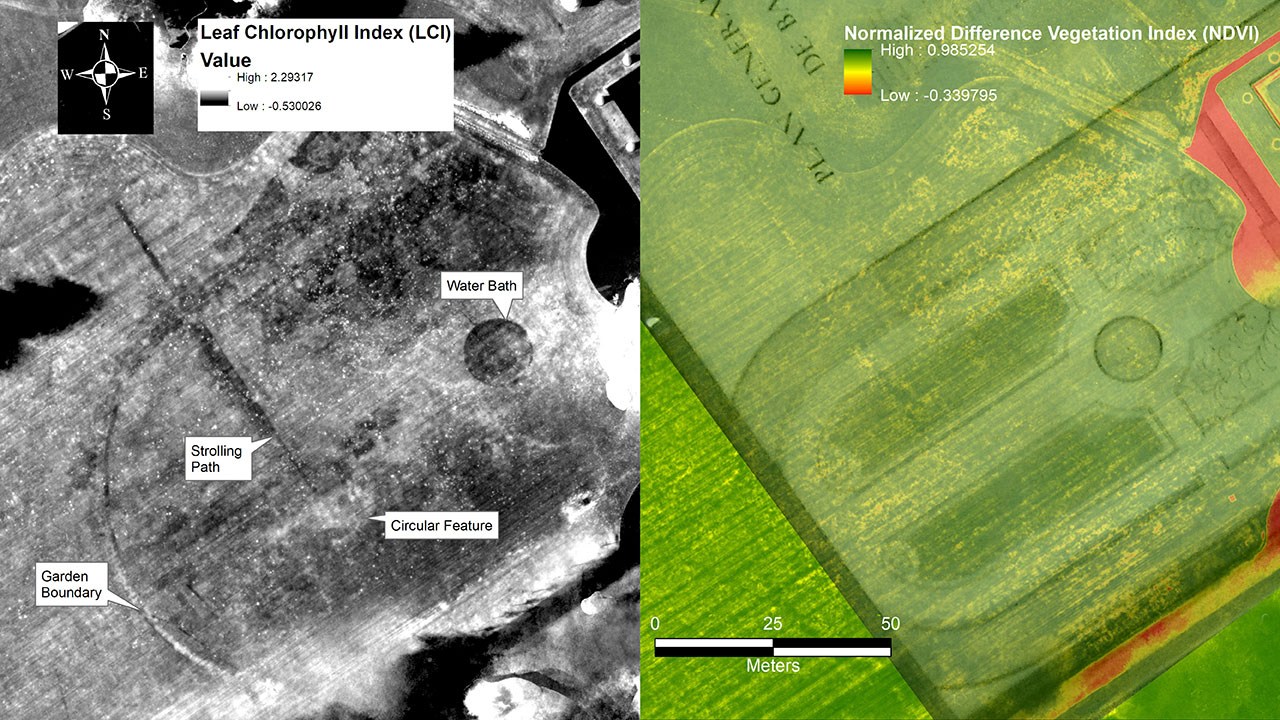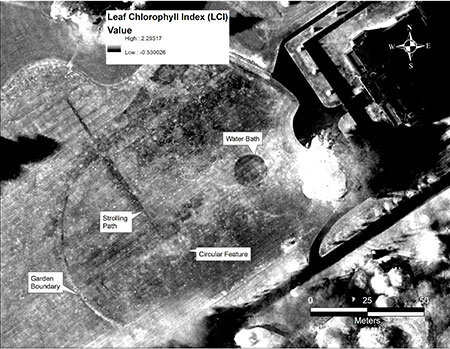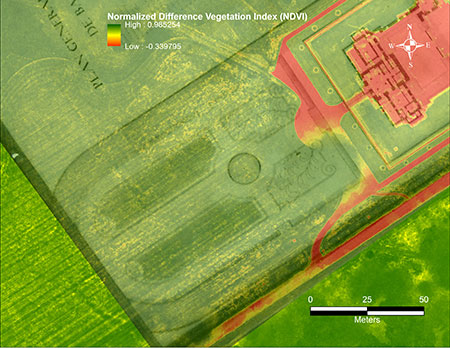- YouTube
- TikTok
OU adds minor in Applied Geographic Information Science

Oakland University has a new academic minor in Applied Geographic Information Science, a dynamic field geared toward solving problems across a range of areas, including public health, food security, urban planning, environmental science and historical preservation.
Drone imagery used to detect archaeological remnants of a 17-century formal garden in Normandy, France. The image shows subsurface archaeological features reflected in differences in vegetation health. (Photo: Jon Carroll) |
Drone image shows the original chateau plan superimposed over multispectral imagery using Geographic Information Systems (GIS) software. The multispectral imagery conveys differences in vegetation health, with green areas signifying better plant health. (Photo: Jon Carroll) |
The 20-credit minor introduces theories, methods and techniques that inform geospatial technologies like the Global Position System (GPS), remote sensing and geofencing. The minor is based in the Department of Anthropology, Sociology, Social Work and Criminal Justice, but is relevant to virtually any area of study, says Professor Jon Carroll, who crafted the minor and guided it through the approval process this past academic year.
“GIScience and geospatial technology is a highly valuable skillset that is applicable to many different issues,” Carroll said. “Whether you’re an archeologist trying to determine where sites are located, a biologist interested in where pollinators or invasive species are, or a businessperson interested in where best to place the next Starbucks, GIScience can be brought to bear on all those questions. It helps us make sense of the world in instances where geography is a primary concern.”
The minor features three core courses – Introduction to Geographic Information Systems, Principles of Cartography, and Remote Sensing (RS) Using Aerial and Satellite Imagery – along with elective courses that allow students to pursue their own interests.
“The minor is very flexible,” Carroll explained. “You take the three core courses, which are typical of any GIScience minor, and then you do additional coursework under the direction of a faculty mentor that is geared toward your particular goals and interests.”
He added, “The applied nature of our minor is what makes it different from other universities in Michigan. We don’t just show you the nuts and bolts of how the technology works, we help you take the technology out into the world and work on a real problem.”
Over the course of his career, Carroll has gained a wealth of experience applying geospatial technologies to modern-day problems. He’s a Registered Professional Archeologist and FAA-licensed drone pilot who has used drone imagery to support agricultural sustainability and disease prevention efforts in Africa, and map the topography of an archeological site in Israel. In addition, Carroll points out that GIScience is relevant to a host of issues close to home, including the Flint water crisis, recent flood events in Metro Detroit and COVID-19 trends.
“These problems each have a geospatial component,” he said. “Where you live affects your probability of drinking contaminated water, experiencing a flood or being at increased risk for disease exposure.”
The GIScience minor is open to all students regardless of major or home department. Graduate coursework opportunities are also offered. AN 3800 – Introduction to Geographic Information Systems, the first class in the minor sequence, is offered fall 2021 and winter 2022. Many advanced courses in the minor have AN 3800 listed as a prerequisite for enrollment. Elective courses include:
- AN 3581 – Archeological Field School
- AN 3995 – Directed Geospatial Research (under supervision of a faculty mentor)
- AN 4950 – Internship in Applied Geographic Information Science
- AN 3803 – Spatial Data Modeling and Analysis
- ENV 4520/PS 3850 – Geographic Information System Analysis for Sustainability
- CRJ 3351 – Geography of Crime
Faculty from across campus teach courses related to the minor including Jacob Becker (Criminal Justice) Annalie Campos (International Studies), Douglas Carr (Political Science), George Milne (History), and David Szlag (Chemistry). Advanced course offerings and associated faculty mentors will be added on an ongoing basis.
For more information about the Applied Geographic Information Science minor at Oakland, contact Carroll at (248) 370-4453 or jwcarroll@oakland.edu. View the web page here.


 August 10, 2021
August 10, 2021
